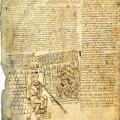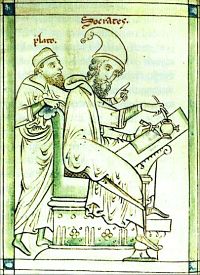201. Stephen Gersh on Medieval Platonism
Posted on
Stephen Gersh (who was Peter's doctoral advisor!) joins him to discuss the sources and influence of Platonism in the Middle Ages.
Themes:
Further Reading
• S. Gersh, From Iamblichus to Eriugena (Leiden: 1978).
• S. Gersh, Middle Platonism and Neoplatonism: the Latin Tradition, 2 vols (Notre Dame: 1986).
• S. Gersh, Concord in Discourse: Harmonics and Semiotics in Late Classical and Early Medieval Platonism (Berlin: 1996).
• S. Gersh and M.J.F.M. Hoenen (eds), The Platonic Tradition in the Middle Ages: a Doxographic Approach (Berlin: 2002).
• S. Gersh, Reading Plato, Tracing Plato: From Ancient Commentary to Medieval Reception (Aldershot: 2005).
• S. Gersh (ed.), Interpreting Proclus: From the Antiquity to the Renaissance (Cambridge: 2014).







Comments
Good overview over various Platonisms at various times
Besides the various streams of Platonism in the first half of the Middle Ages I found it very interesting that Platonism lived on while Aristotelianism had its heyday - and amazing that the Byzantines made nothing of Plato, although they had Plato in full and in original. How crazy is this?
Excellent podcast!
Thank you for an excellent podcast! I certainly learned a lot (including that I've been mispronouncing "Proclus"!)
Did I understand Prof. Gersh as saying that Theodore of Mopsuestia was an important source by which Platonism reached the Middle Ages? If so, I wish I could learn more about that.
Plato vs Aristotle
If i recall, Copleston recounts an anecdote of someone enthusiastically going to a lecture by Plato and being disappointed that it wasn't like the dialogues but was rather arcane and boring mathematical philosophy.
Copleston's point was that Plato's dialogues were for general readership but he delivered technical lectures too which are now lost to us.
Meanwhile you talked earlier in the podcast of Aristotle's lost exoteric works and his retained esoteric works (his lecture notes?)
Are Aristotle and Plato's surviving works situation exactly complementary?
I think people often view Plato as more mystical and intuitive and Aristotle as more rigorous and technical but do you think we'd view the temperament of them both as roughly similar if the esoteric and the exoteric works had survived for both of them?
In reply to Plato vs Aristotle by Xavier
Esoteric Plato and Aristotle
Right, that story from Copleston comes from a late ancient commentator: Plato announced a lecture "On the Good" and when people turned up he only talked about mathematics, and people were flummoxed. Obviously this can be taken with a grain of salt since the report comes from many centuries later, but still. The situation with Aristotle is the reverse: we only have his "esoteric" works but this means works written for use within his school; they are somehow connected to his teaching practice but we aren't sure how. He also wrote "exoteric" works i.e. for wider circulation but these are lost; supposedly they were stylistically excellent.
I still think there were profound philosophical differences between them, but of course not because Plato was "mystical and intuitive"! There is plenty of technical philosophy in the surviving dialogues, actually.
Add new comment